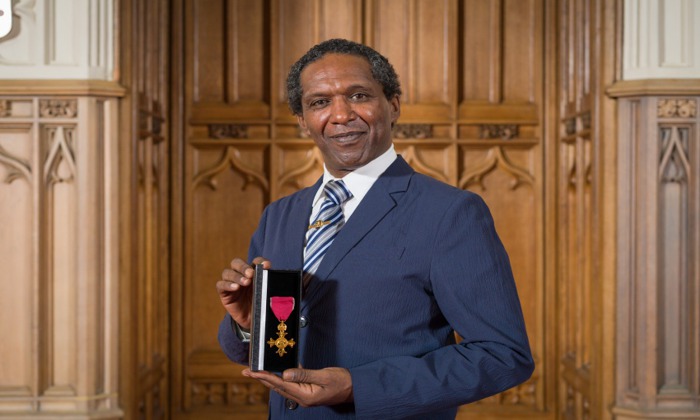Chancellor Lemn Sissay receives OBE at Windsor Castle
17 Mar 2022
Our Chancellor and acclaimed poet and author Lemn Sissay was honoured for services to literature and charity

Lemn received his investiture from HRH The Prince of Wales on Wednesday, 16 March. In his inimitable style, Lemn stopped off at McDonald's on his way to Windsor Castle for a coffee. Lemn received an MBE in 2010 and his OBE adds to his list of considerable achievements.
Lemn has published several collections of poetry and his critically-acclaimed memoir My Name is Why is a searing indictment of the British care system in the 1960s. Much of his childhood was spent in foster and care homes and his experiences feature prominently in his work. He was the official poet of the 2012 London Olympics and became our Chancellor in 2015. During his tenure, he established a bursary scheme to support Black talent in the legal profession.
His charitable work includes the Christmas Dinners project, which enables care leavers aged 18 to 25 to have a Christmas Day to remember, supported by local communities. The initiative now takes place in a number of cities across the UK. He sits on the board of trustees of the Foundling Museum, who work to transform the wellbeing and life chances of vulnerable children and young adults. Lemn regularly appears on TV, including the BAFTA-nominated Superkids: Breaking Away from Care and BBC's Winter Walks, and he's also made an appearance on BBC Radio 4's Desert Island Discs. He has recently published his first book for children, Don't Ask the Dragon.
Dedicating his award to his younger self, Lemn said: “If I had said to him that one day you will be in Windsor Castle to receive an OBE from Prince Charles, I would never have believed that kind of magical story – almost fairy tale – would happen.”
He added: “If you can go to that boy – who lost his family, who left children’s homes at 18 years of age and didn’t know anybody for longer than a year at that age and had spent all of those Christmases alone – if you were going to say to that child that, ‘In your adulthood you are going to be honoured for what it is that you do and who it is that you are but you have got to turn it down…’
“I just could not do that to him. This is a way of being able to honour service and what you were born to be. I was born to be a poet.
“The service is the work (I have done) for care leavers and it has come from my own experience.”
